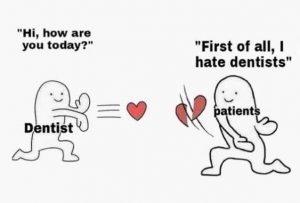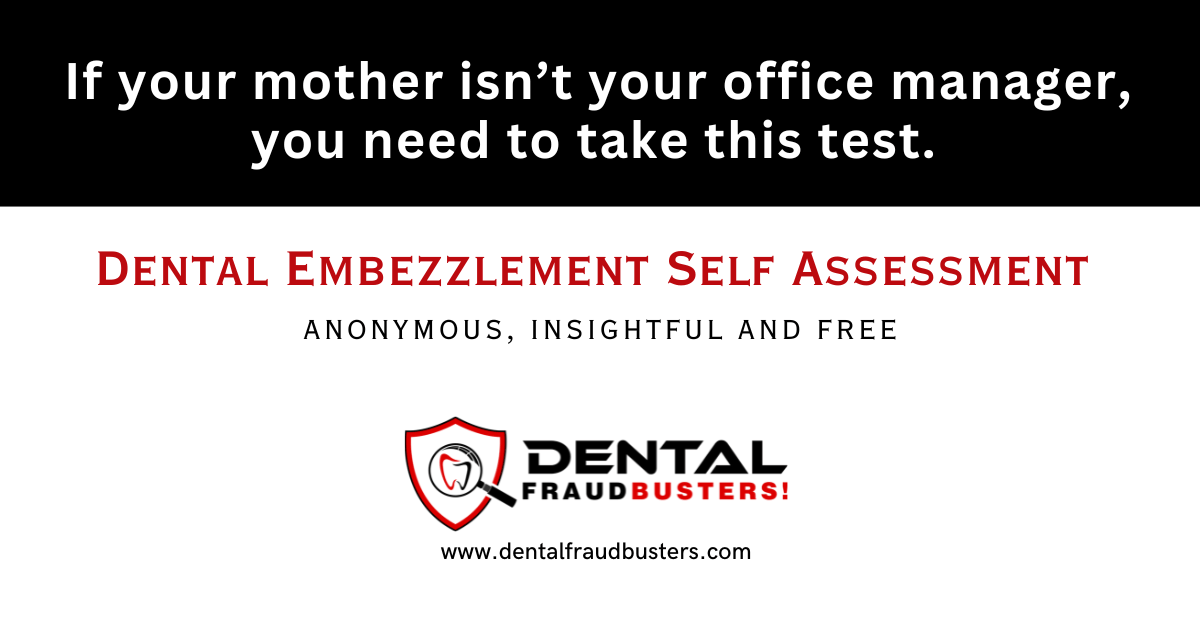You’ve just discovered your dental receptionist is stealing. What now?
“I think dentists just let it go because getting into an all out fight with an individual will likely end up damaging the practice for more then the stolen amount, even $20k, if that individual enlists all their friends and family to badmouth the practice online and in the area, you will likely loose much more then $20K worth of business not to mention any potential legal/marketing fees/stress.“
Practice Owner
Posted:
Last Updated:
Deciding TO LET HER GO.
The first thought that comes to most dentists when faced with a dishonest employee is to say to themselves,
“I’ll just let just let her go.“
They believe the best solution to their “dishonesty problem” is to simply terminate the person’s employment and move on.
That makes sense – no one enjoys confrontation. Confrontation is unpleasant and we want to avoid it.
But is it the best or right decision?
Some dentists avoid confronting employee theft for fear of retaliation.
“Her friends and family will badmouth the practice online.”
It’s very unlikely her friends and family will start badmouthing you online, and if by chance they do, then they’ve committed libel. A properly worded letter from your attorney can resolve the matter.

“My patients love her and they will hate me if I accuse her of stealing.”
Guess what. Your patients already hate you. Just kidding – all your patients love you. Most of them anyway, most of the time. :-)
Some dentists fear holding their employee accountable.
Some believe they don’t have “enough proof” to fire their employee.
Others fear being sued for wrongful termination.
So why do so many dentists and practice owners believe that the best solution to their employee dishonesty problem is to suck it up, let her go and move on?
That was a trick question. It’s not the best solution, but it is the easiest – and it can be the costliest.
Here are some things that can go wrong when you let a dishonest employee go without any accountability.
YOUR EX-EMPLOYEE IS HIRED BY ANOTHER OFFICE
Soon after firing your employee, you learn they were hired by another dentist. Ugh… “your problem” has now become “their problem”.
Can you imagine meeting the dentist who hired your ex-employee and then tells you she was caught stealing. Talk about feeling awkward.
Your ex-employee “bad-mouths” you and your practice.

There is a high probability that your former employee will start to bad-mouth you and your practice the moment she walks out the door.
She’ll do it at her new workplace and to her friends. Some will make frivolous allegations, saying things like you abuse drugs, alcohol or children. Others will say you committed fraud, have a psychological disorder, or are a gambling addict.
They do this to tarnish your reputation in order to build a wall between you, their friends and the new office where they work.
THEY CONTINUE TO STEAL FROM YOU AFTER THEY ARE GONE

During the time your employee worked for you, they likely had access to information about you, your business affairs, and your other employees. Dishonest employees can also copy patient records.
Then, after the employee has been “let go” they use this information to withdraw money from your bank account, obtain credit lines or credit cards in your name. (yes, it is easier than you are thinking)
You may also find yourself unexpectedly billed for things you did not purchase. For example, a former employee may still have access to an online account (like Amazon) and begin racking up orders sent to a different address. (this happens, more often that you’d expect)
They can also steal credit card information from you, your employees or patients to commit additional frauds, week and months after they were fired.
YOU ARE SUED FOR WRONGFUL TERMINATION

All dishonest employees maintain a strong sense of self-entitlement towards their employer’s money, and this self-entitlement does not stop after they have been fired.
When you fire a dishonest employee “without cause“, they may decide to hire an employment lawyer and threaten to sue you!
Here is what happened in one of my previous cases . (for brevity, I have left out many details)
The dentist suspected his employee was stealing and decided because he was in an “at will” state, he could just fire her.
The dentist confronted the employee, told her she was for stealing and said “your fired!”
The former employee filed a wrongful termination lawsuit.
About a month later, the dentist hired me to perform a fraud examination an confirm if his suspicions were correct and that she was stealing.
I uncovered about $60,000 in theft and submitted my report to the dentist.
The dentist used my report and the $60,000 theft as ammunition in the wrongful termination lawsuit.
It did not go well.
The judge told the dentist that the theft was not admissible in the wrongful termination lawsuit.
The court ruled that because the theft was discovered after the employee was fired, it was not admissible.
The dentist lost the wrongful termination lawsuit and was ordered to pay $80,000 in damages to his former employee. He subsequently filed a counter suit for damages.
YOUR PATIENTS START TO COMPLAIN

Dishonest employees will use various methods to conceal their thefts. They conceal their dirty work by adulterating patient ledgers and records .
Soon after the employee has left the practice, patients can start complaining that their statements are not correct.
“I already PAID THIS! Why are you sending me a bill.”
“Why did my insurance company send this to me?”
Your staff may not know how to properly respond to patient complaints like this. Patients can (and do) lose faith in the office.
“If they can’t keep my account balance (or insurance) straight, how can they do dentistry?”
YOUR UNEMPLOYMENT TAX GOES UP

In many states, being fired for theft will stop your employee from receiving unemployment benefits.
When you just “let her go”, your former employee can file for unemployment benefits and you see an increase in your Federal Unemployment Tax payments.
That’s like being ripped off twice!
PATIENTS LEAVE YOUR PRACTICE
If your dishonest employee has been with the practice for many years, they will have developed friendships and relationships with many of your patients.
After the dishonest employee is gone, patients will often ask questions:
“Why is she not working here anymore?”
“What happened to Janie, where is she gone?”
If you have not terminated the employee for theft and “just let her go”, some patients will think your a “bad person” (yes, this happens) Those patients believe that you should not have dismissed the person they liked the most.
INSURANCE COMPANIES START ASKING QUESTIONS
It is common for a dishonest employee to commit healthcare fraud by over-billing insurance companies for work that was not done. These schemes can go on for months or years, under the watchful eye of a dishonest employee.

While working in the practice, your dishonest employee was there to respond to unusual questions about billings and payments from insurance companies.
When your dishonest employee is gone, there is no one in the practice to deflect those questions. That’s when red-flags can go up.
In one case, an employee was billing insurance companies for services that the dentist did not perform. She used the practice bank account to launder the insurance money and the dentist wound up repaying over a quarter-million dollars to the insurance companies for money that the employee had stolen.
“JUST LETTING HER GO” SENDS THE WRONG MESSAGE TO STAFF AND YOUR PEERS
The employees who remain with your practice after you “let her go” will feel you made a poor and unethical choice to not hold the dishonest employee accountable.
It also tells any would be embezzlers that your an easy target and won’t bother to hold them accountable if they were ever caught.
Red flags can be significant in uncovering financial misconduct.
A staggering 85% of embezzlement cases involved at least one of the Top Six embezzlement red flags.
CLICK ON THE IMAGE TO TAKE THE ASSESSMENT


